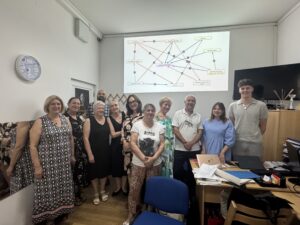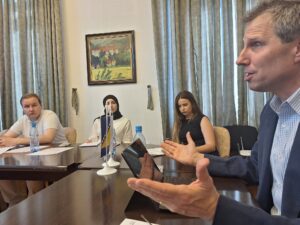With field research, public events, and media appearances,Yale scholars reflected on 30 years since Srebrenica, emphasizing the role of young people in peacebuilding and the urgent need for stronger global protections against mass atrocity.
The Peacebuilding Initiative at Yale Jackson School of Global Affairs recently completed a major milestone in its ongoing work in Bosnia and Herzegovina. This included original research, public events, and national television appearances, in June and July 2025.
Led by professors Catherine Panter-Brick and David Simon, co-directors of the Peacebuilding Initiative, research and outreach activities were conducted in partnership with two local non-governmental organizations and supported on the ground by Peacebuilding Fellow and Yale College student Mak Nurkić Kačapor.

The research focused on “Building Peace Across Generations” – an international, comparative study that empirically documents how communities envision everyday peace in post-conflict settings. In June, the research team conducted 15 focus group discussions in the city of Mostar, followed by another 15 focus groups in Sarajevo and East Sarajevo in July. In these sessions, younger and older generations – born either side of the Bosnian War of 1992–1995 – generated their own definitions of peace and visually mapped how they perceived the causal pathways to peace.
The Mostar-based fieldwork was led by Professor Panter-Brick, also Director of the Conflict, Resilience, and Health Program at Yale, in partnership with Everyday Peace Indicators (EPI). The Sarajevo-based research was led by Professor Simon, also Director of the Genocide Studies Program at Yale, in collaboration with the Institute for Development Impact (I4DI).
Insights from this research will contribute to academic literature and inform a forthcoming policy brief to be presented at the Dayton Peace Agreement Conference, hosted by the University of Sarajevo in November 2025.
The Yale team was featured in national and international media, where they emphasized the role of youth in peacebuilding and reconciliation, reflecting on the 30 years since Srebrenica and current global narratives on atrocity prevention. Simon appeared on N1 Television – a 24-hour cable news channel and CNN International’s local broadcast partner – where he stated, “We currently lack a healthy international regime to safeguard civilians, as national interests continue to be placed above international institutions, law, and justice.”
Parallel to the study, Simon and Nurkić participated in a three-day international academic conference on genocide in Srebrenica. Titled “Srebrenica 30 Years After the Genocide: Memory, Responsibility,” and Challenges of Denial, the conference brought together scholars from around the world to examine the responsibilities of remembrance and the persistence of genocide denial.
At the conference, Simon presented his paper, co-authored with Sophie Foster, “Return and Belonging: Three Decades of Struggle in Srebrenica,” which explores the long-term impacts of displacement and the challenges survivors face in rebuilding lives and communities.

